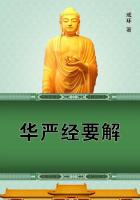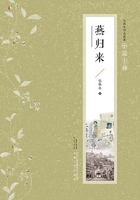In spite of the coolness and discretion with which Philippe played his trifling game every night, it happened every now and then that he was what gamblers call "cleaned out." Driven by the irresistible necessity of having his evening stake of ten francs, he plundered the household, and laid hands on his brother's money and on all that Madame Descoings or Agathe left about. Already the poor mother had had a dreadful vision in her first sleep: Philippe entered the room and took from the pockets of her gown all the money he could find. Agathe pretended to sleep, but she passed the rest of the night in tears. She saw the truth only too clearly. "One wrong act is not a vice," Madame Descoings had declared; but after so many repetitions, vice was unmistakable. Agathe could doubt no longer; her best-beloved son had neither delicacy nor honor.
On the morrow of that frightful vision, before Philippe left the house after breakfast, she drew him into her chamber and begged him, in a tone of entreaty, to ask her for what money he needed. After that, the applications were so numerous that in two weeks Agathe was drained of all her savings. She was literally without a penny, and began to think of finding work. The means of earning money had been discussed in the evenings between herself and Madame Descoings, and she had already taken patterns of worsted work to fill in, from a shop called the "Pere de Famille,"--an employment which pays about twenty sous a day.
Notwithstanding Agathe's silence on the subject, Madame Descoings had guessed the motive of this desire to earn money by women's-work. The change in her appearance was eloquent: her fresh face had withered, the skin clung to the temples and the cheek-bones, and the forehead showed deep lines; her eyes lost their clearness; an inward fire was evidently consuming her; she wept the greater part of the night. A chief cause of these outward ravages was the necessity of hiding her anguish, her sufferings, her apprehensions. She never went to sleep until Philippe came in; she listened for his step, she had learned the inflections of his voice, the variations of his walk, the very language of his cane as it touched the pavement. Nothing escaped her.
She knew the degree of drunkenness he had reached, she trembled as she heard him stumble on the stairs; one night she picked up some pieces of gold at the spot where he had fallen. When he had drunk and won, his voice was gruff and his cane dragged; but when he had lost, his step had something sharp, short and angry about it; he hummed in a clear voice, and carried his cane in the air as if presenting arms. At breakfast, if he had won, his behavior was gay and even affectionate; he joked roughly, but still he joked, with Madame Descoings, with Joseph, and with his mother; gloomy, on the contrary, when he had lost, his brusque, rough speech, his hard glance, and his depression, frightened them. A life of debauch and the abuse of liquors debased, day by day, a countenance that was once so handsome. The veins of the face were swollen with blood, the features became coarse, the eyes lost their lashes and grew hard and dry. No longer careful of his person, Philippe exhaled the miasmas of a tavern and the smell of muddy boots, which, to an observer, stamped him with debauchery.
"You ought," said Madame Descoings to Philippe during the last days of December, "you ought to get yourself new-clothed from head to foot."
"And who is to pay for it?" he answered sharply. "My poor mother hasn't a sou; and I have five hundred francs a year. It would take my whole year's pension to pay for the clothes; besides I have mortgaged it for three years--"
"What for?" asked Joseph.
"A debt of honor. Giroudeau borrowed a thousand francs from Florentine to lend me. I am not gorgeous, that's a fact; but when one thinks that Napoleon is at Saint Helena, and has sold his plate for the means of living, his faithful soldiers can manage to walk on their bare feet," he said, showing his boots without heels, as he marched away.
"He is not bad," said Agathe, "he has good feelings."
"You can love the Emperor and yet dress yourself properly," said Joseph. "If he would take any care of himself and his clothes, he wouldn't look so like a vagabond."
"Joseph! you ought to have some indulgence for your brother," cried Agathe. "You do the things you like, while he is certainly not in his right place."
"What did he leave it for?" demanded Joseph. "What can it matter to him whether Louis the Eighteenth's bugs or Napoleon's cuckoos are on the flag, if it is the flag of his country? France is France! For my part, I'd paint for the devil. A soldier ought to fight, if he is a soldier, for the love of his art. If he had stayed quietly in the army, he would have been a general by this time."
"You are unjust to him," said Agathe, "your father, who adored the Emperor, would have approved of his conduct. However, he has consented to re-enter the army. God knows the grief it has caused your brother to do a thing he considers treachery."
Joseph rose to return to his studio, but his mother took his hand and said:--
"Be good to your brother; he is so unfortunate."
When the artist got back to his painting-room, followed by Madame Descoings, who begged him to humor his mother's feelings, and pointed out to him how changed she was, and what inward suffering the change revealed, they found Philippe there, to their great amazement.
"Joseph, my boy," he said, in an off-hand way, "I want some money.
Confound it! I owe thirty francs for cigars at my tobacconist's, and I dare not pass the cursed shop till I've paid it. I've promised to pay it a dozen times."
"Well, I like your present way best," said Joseph; "take what you want out of the skull."
"I took all there was last night, after dinner."
"There was forty-five francs."
"Yes, that's what I made it," replied Philippe. "I took them; is there any objection?"
"No, my friend, no," said Joseph. "If you were rich, I should do the same by you; only, before taking what I wanted, I should ask you if it were convenient."













